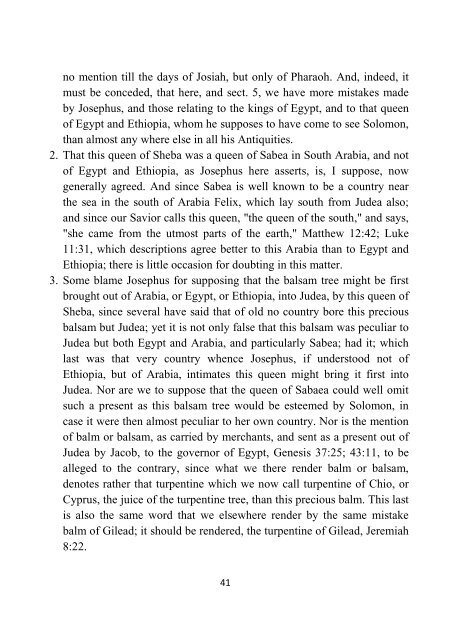From the Death of David to the Death of Ahab - Flavius Josephus
- No tags were found...
Create successful ePaper yourself
Turn your PDF publications into a flip-book with our unique Google optimized e-Paper software.
no mention till <strong>the</strong> days <strong>of</strong> Josiah, but only <strong>of</strong> Pharaoh. And, indeed, it<br />
must be conceded, that here, and sect. 5, we have more mistakes made<br />
by <strong>Josephus</strong>, and those relating <strong>to</strong> <strong>the</strong> kings <strong>of</strong> Egypt, and <strong>to</strong> that queen<br />
<strong>of</strong> Egypt and Ethiopia, whom he supposes <strong>to</strong> have come <strong>to</strong> see Solomon,<br />
than almost any where else in all his Antiquities.<br />
2. That this queen <strong>of</strong> Sheba was a queen <strong>of</strong> Sabea in South Arabia, and not<br />
<strong>of</strong> Egypt and Ethiopia, as <strong>Josephus</strong> here asserts, is, I suppose, now<br />
generally agreed. And since Sabea is well known <strong>to</strong> be a country near<br />
<strong>the</strong> sea in <strong>the</strong> south <strong>of</strong> Arabia Felix, which lay south from Judea also;<br />
and since our Savior calls this queen, "<strong>the</strong> queen <strong>of</strong> <strong>the</strong> south," and says,<br />
"she came from <strong>the</strong> utmost parts <strong>of</strong> <strong>the</strong> earth," Mat<strong>the</strong>w 12:42; Luke<br />
11:31, which descriptions agree better <strong>to</strong> this Arabia than <strong>to</strong> Egypt and<br />
Ethiopia; <strong>the</strong>re is little occasion for doubting in this matter.<br />
3. Some blame <strong>Josephus</strong> for supposing that <strong>the</strong> balsam tree might be first<br />
brought out <strong>of</strong> Arabia, or Egypt, or Ethiopia, in<strong>to</strong> Judea, by this queen <strong>of</strong><br />
Sheba, since several have said that <strong>of</strong> old no country bore this precious<br />
balsam but Judea; yet it is not only false that this balsam was peculiar <strong>to</strong><br />
Judea but both Egypt and Arabia, and particularly Sabea; had it; which<br />
last was that very country whence <strong>Josephus</strong>, if unders<strong>to</strong>od not <strong>of</strong><br />
Ethiopia, but <strong>of</strong> Arabia, intimates this queen might bring it first in<strong>to</strong><br />
Judea. Nor are we <strong>to</strong> suppose that <strong>the</strong> queen <strong>of</strong> Sabaea could well omit<br />
such a present as this balsam tree would be esteemed by Solomon, in<br />
case it were <strong>the</strong>n almost peculiar <strong>to</strong> her own country. Nor is <strong>the</strong> mention<br />
<strong>of</strong> balm or balsam, as carried by merchants, and sent as a present out <strong>of</strong><br />
Judea by Jacob, <strong>to</strong> <strong>the</strong> governor <strong>of</strong> Egypt, Genesis 37:25; 43:11, <strong>to</strong> be<br />
alleged <strong>to</strong> <strong>the</strong> contrary, since what we <strong>the</strong>re render balm or balsam,<br />
denotes ra<strong>the</strong>r that turpentine which we now call turpentine <strong>of</strong> Chio, or<br />
Cyprus, <strong>the</strong> juice <strong>of</strong> <strong>the</strong> turpentine tree, than this precious balm. This last<br />
is also <strong>the</strong> same word that we elsewhere render by <strong>the</strong> same mistake<br />
balm <strong>of</strong> Gilead; it should be rendered, <strong>the</strong> turpentine <strong>of</strong> Gilead, Jeremiah<br />
8:22.<br />
41

















